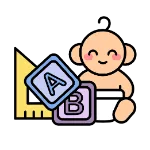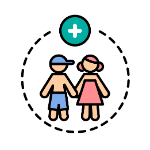
Parenting
A Guide To Respectful Parenting Support From Infants To Toddles For The Modern Asian Parent
10 min read | Updated on 30-03-2023 by HappyPreggie
"Punishment might bring short-term obedience, but it will hurt the connection you have with your children in the long run". Every parent wants to do the right thing for their children. Creating a positive and respectful parent-child relationship is a continuous feat to be done daily. But in order to receive cooperation from your children, having responsive connections and interactions are the keys to the respectful parent-child relationship.

In this Q&A With Expert Series, we have Ms. Carmen Chan who is a Parent Educator and Co-founder of Raised with Wonder, a Respectful Parenting Advocate to share her advice on the most frequently asked questions about your relationship with an infant to toddler.
This can be so frustrating. Know that a young child’s brain is highly underdeveloped when it comes to impulse control and regulating their emotions. So frequent tantrums are a sign that your child is developing normally. Research shows that the part of the brain that controls emotional regulation doesn’t fully develop until their mid-twenties!
The good news is you can manage it confidently without needing to yell or punish. Here’s what you can do:
It’s easy to also want to lose it when your child is screaming and flailing. The urge to yell “stop it!” or do something to them to make the tantrum stop can be very real.
If you need to leave your child with another caregiver for a few minutes to calm yourself, go ahead and do that. You can let your child know, “Mama feels really angry right now and I need to go to my room to calm down for a few minutes. I’ll be back with you when I’m calmer.”
Reframing tantrums as being a healthy part of their development helps too as it reminds us that it’s not an emergency and letting them release those emotions can help them become more balanced after it.
So try to stay as calm as possible without joining in their dysregulation as your calm presence will help your child calm down easier.

Allowing and acknowledging feelings will help your child feel seen and heard. That’s what’s going to make a difference. Instead of trying different things in an attempt to stop the crying, just allowing the feelings to be expressed and acknowledging them will help your child feel understood.
This can sound like:
“You’re so upset it’s time to leave now. You still want to go on the slide.
“I hear that you want mama to be with you now. She’s in a meeting and I’m going to be with you until she comes out. It can be so hard to wait for mama.”
On top of that, observe your child’s needs at the moment. Is he asking for a hug? Does he find comfort in you stroking her back? Does she just want some space without you touching her? Observe those needs and provide that comfort without trying to stop the expression of feelings.
Your child may be flailing and screaming their heads off, and you being their confident leader can continue to hold the boundary as this will in time help your child adapt to the boundary better in time. Let me show you what I mean:
“Would you like to walk to the shower or would you like me to carry you? It looks like you need me to carry you. Here we go.”
“You’re telling me you really don’t want to be in the car seat. I hear you. And I need to keep you safe. Here, I’m putting your left hand in, then your right, and I’m buckling it up.”
Being consistent and confident in your boundaries will help your child tantrum less in the future because they know what to expect.
It’s tempting to want to hush them and make all the yucky feelings your child is feeling go away. As tempting as it is, it’s the healthier option for your child's emotional health to allow them to express their feelings all the way. To let them ride the waves of emotions, knowing that they will pass. Allowing them to ride it out until they’re done, gives them a chance to realise that emotions come and go and they don’t have to suppress them or be afraid of them.
It can be very worrying to see your child hit somebody else, especially in a setting outside of the home where you’re not there. If hitting, pushing or other behaviour that displays aggression happens in your presence, this is what you can do.

At the moment,
Outside of the moment when your and your child are calm,
Lastly, talk to your child’s teacher about what strategies your child’s teacher uses in situations like this and communicate the strategies you use. Discuss a plan for handling this when he’s in school.
Remember that your child is not a bad kid or a bully if they show aggressive behaviour. They’re still a good kid who is still learning to regulate themselves and needs our help.
Q3. I have tried all kinds of baby food and fruits, even some snacks but my toddler pushes most of them away. How do I handle my toddler’s picky eating habits?
If your child rejects most foods and only sticks to a few, I recommend seeking medical help first to eliminate any possibility of medical concerns. If there are no medical concerns, here are a few things to consider to help your child:
When there is no pressure to eat or how much to eat, your child is free from needing to engage in power struggles or to please you to eat. They will be able to eat according to their bodies’ hunger cues and stop when they feel full.
This means that there is no need to force your child to eat a certain food or force them to take just one bite. There is also no need to reward your child with dessert or other things to make them eat. Praises are also not necessary. All these are also a form of pressure that might make your child pickier with food.
Remember at the dinner table, your responsibility is to provide the types of food and your child’s responsibility is to decide whether to eat or how much to eat.
Research shows that it takes up to 8 -15 exposures to a type of food to enhance acceptance for it. So don’t think that your child is picky just when they refuse a portion of food on the first few introductions. Here’s what you can do to increase exposure to a certain type of food:

Have set times in a day for meal times and snack times so your child is not grazing all throughout the day. This will set your child up to be hungry enough to focus on eating during their meals and will be more open to trying foods they usually don’t eat.
I know it can be so tempting to use screens as a distraction so your child at least eats some amount of food that they normally won’t eat. But this creates a habit of distracted eating while what we want for our children is to practice mindful eating and be aware of what’s on their plate.
Q4. I do know that I parent my children based on experts' advice compared to my other family members. What kind of parenting approaches should I or my family members use with their and my children when we are gathering?
Always remember that you are the parent. You can only control your own thoughts and behaviours and not those of others. In a family gathering, other family members may have differing opinions on how to raise children. While everyone is entitled to their personal opinion, you are your child’s parent and are responsible for making the decisions that feel right for your family. Having said that, you don’t need to impose your parenting approach on others. If there are boundaries that need to be set, try to give your family a heads up beforehand. And then at the moment, hold those boundaries for your child kindly but firmly. This could sound like “I’m not comfortable with him watching cartoons on your phone. Let’s find something else we can do together”
Q5. I always lose my cool when teaching my young kid his maths subject, especially when I repeat it a lot and he still doesn’t get it. Is my kid hating the subject or he just couldn’t understand it? Please help me!
It can be so frustrating when you keep teaching something and your child doesn’t get it. I’m a strong believer that children are hard-wired to seek out their own learning and are motivated to learn according to their interests, according to their own timetable. Only when a child is ready and interested, then learning can happen.
Your child might have not acquired the necessary skills to do the math subject that you are trying to teach. Math learning builds upon different basic skills such as the ability to recognize patterns, the ability to read numbers, different concepts of adding and subtracting, and so on. It can also be that the way he’s being taught these math topics may not be the best way he learns.
It might also be a resistance that your child has developed because of negative associations around learning math. You mentioned that you lose your cool and that might add to the unwillingness to understand the subject.
Before you start blaming yourself, do know that all is not lost and there is much hope. Allow me to propose to you a way that requires much less intervention or teaching and that your child can truly authentically learn - that is through child-led free play. It’s where you allow your child to just engage in play without directing his play and there’s no need to set up activities to teach him anything.

Through child-led free play, your child will be able to engage in his interests and explore math concepts, or other concepts without even knowing he’s learning all those things.
What you can do is to provide open-ended materials and toys such as blocks, balls, toy vehicles, peg dolls, loose parts and allow him space to practice the skill of independent play. Having picture books that have math elements easily accessible in your home can also increase your child’s interest in math.
Another way to help your child learn math is to involve him in everyday activities that require math. For example, when you’re preparing a sandwich for him, ask him if he wants the sandwich to be cut into halves or quarters. When pouring a drink for him, let him choose if he wants a full cup or half a cup. When picking up grocery, allow him to put the number of fruits you require into the shopping basket. Through the use of functional math being used in everyday life, your son will be exposed to math that makes more sense to him.
In his own way and in his own time, your son will be able to develop the skills that he needs.
If you still have strong concerns about his ability to comprehend math, do trust your gut and seek the help of professionals like clinical psychologists or developmental paediatricians who would be able to screen for learning disabilities.
Q6. My child is being bullied by his schoolmates. I want to help without embarrassing him/ her. What should I do?
It’s so hard to see our children experience bullying. Parental instincts kick in and the desire to just tell the bully-off or do something to fix the situation for your child can be strong. In these moments, remember that helping your child by helping them feel understood and empowering them to face the situation will be more helpful compared to you trying to solve the problem for them. The problem might not go away overnight anyways. Here are some tools that are inspired by Dr. Becky, a Clinical Psychologist, that you can try to help your child in this difficult situation.
When we come in straight away with “This is what you can do”, “Tell the teacher”, “Tell them to stop” straight away when your child tells you that they’re being bullied, it can create a sense of they are facing this difficult situation alone and they have to do all these things you’re telling them alone when they go to school. If they couldn’t do it then they might feel even worse.
To help your child feel less alone in the situation, get curious when your child tells you they’re being bullied. You could say something like this: “Thank you so much for telling mama that this happened. This is very important to me and I want to know more about it.” “Did it happen in your class? Where were you in the classroom? Oh, you were at your seat and they came and said that to you.”
Just talking through the specifics of the event and helping your child feel that you are with them in the situation and understanding how it was, helps them feel that you are with them in this.

Other than talking about what happened, it is helpful to also talk through your child’s feelings to help them feel understood and not alone. Asking questions like “I wonder how you felt when they said that to you?” Help them identify and become aware of those feelings. If your child can’t identify them yet, you could try to offer some suggestions. “Did you feel happy?” “No?” “Were you feeling sad?” “Did you feel scared?”
Children are more receptive to suggestions of how to handle the situation when engaged in play. You could use peg dolls to role-play what happened when your child was being bullied with different characters. “One day Elsa was doing her own thing in the snow and a bunch of people came and told her that she was weird. Elsa felt so sad. She went to tell Anna all about it and Anna told Elsa that she could tell those people to stop saying those things because she doesn't like it.” “The next day, that group of people came to tell Elsa that she was weird and to stop playing with snow. So Elsa told them to stop saying that because she doesn’t like it.” The idea is to help your child work through what they can try doing without explicitly instructing them on what to do. This gives your child the autonomy to try out what’s being played out during her play.
The main idea for these strategies is that you are helping your child feel less alone in the situation and empowering them to face the situation. Because they are not weak and helpless. With your support, your child can gain confidence to face situations like these.
That being said, I want to also say that you should trust your gut. If you feel like you need to let your child’s teacher or principal know about it or it gets to a point where you have to think about moving schools, you know what’s best for your child and listen to that voice within. There’s no right or wrong, just what you think is best for your child.
Q7. What is the best way to make my children behave well-mannered without sounding stern and abusive?
I’m assuming well-mannered means what is normally considered manners like saying please, thank you’s or addressing an elder when your child meets them. The best way to teach manners is through modelling. It’s when we model well-mannered behaviour towards our kids and others that they pick it up. Forcing children to be well-mannered by scolding or punishing is the opposite of what we want to model to our children. It also just makes a child say the words without meaning it, which is not what we won't either.
Manners are more caught than taught. So trust that your child is not a rude kid and will eventually display these manners in their own way and time when they’ve observed us treat them and others with respect.
Q8. My children are growing and I feel it’s time I discuss with them about sex, good touch, and bad touch. Where do I begin?
Ideally, it would be good to start teaching body boundaries as young as possible. This can look like respecting your infant’s body by asking them before picking them up or letting your toddler know that they can say “no” when they don’t want to hug or be touched by someone. Your respect for your child’s body boundaries when they say “no” would be a great place to start teaching your children that their “no’s” have power.

In terms of talking about sex, you can start by talking about your kids’ genitals using anatomical names such as vagina, vulva, penis, scrotum, and so on just like any other body part instead of calling them names like “pee-pee”, “flower” or “bird bird”. This as well can be used as soon as they are born. The idea behind this is to take the shame out of these body parts and it will be easier to talk about sex when you do. Research has also shown that kids who use correct names for private parts are less likely to be sexually abused or have a higher chance of reporting sexual abuse if it happens.
For younger children (3-4 yrs old), talking about sex and how babies are made as a story about an egg and a seed will be sufficient. You don’t have to go into much detail as children this age might not be ready for more graphic elaborations. For school-going children (5-7 yrs old), you can use books to talk about the process of intercourse and how the process of conception takes place. For older children, you can go into much detail and provide more information. ⠀
The ones who talk about sex first to your child will be the ones whom they trust for information like this. So you want to be the first to talk to them about it instead of the media or their friends.
Talking about sex is not just a one-off event but something that requires constant open dialogue. Try to remain non-judgemental when your child comes to you with questions and continue to welcome the conversation.
For more parenting insights and useful tips, check out Positive Parenting Techniques For Disciplining Your Child, These 8 Steps Help You To Handle Upset Toddlers and Common Parenting Tactics That Aren't Good For Your Kid.
In this Q&A With Expert Series, we have Ms. Carmen Chan who is a Parent Educator and Co-founder of Raised with Wonder, a Respectful Parenting Advocate to share her advice on the most frequently asked questions about your relationship with an infant to toddler.
Q1. My child is always throwing temper tantrums even for small things. How do I handle his sudden emotional outbursts?
This can be so frustrating. Know that a young child’s brain is highly underdeveloped when it comes to impulse control and regulating their emotions. So frequent tantrums are a sign that your child is developing normally. Research shows that the part of the brain that controls emotional regulation doesn’t fully develop until their mid-twenties!
The good news is you can manage it confidently without needing to yell or punish. Here’s what you can do:
#1 Be the calm to their chaos
It’s easy to also want to lose it when your child is screaming and flailing. The urge to yell “stop it!” or do something to them to make the tantrum stop can be very real.
If you need to leave your child with another caregiver for a few minutes to calm yourself, go ahead and do that. You can let your child know, “Mama feels really angry right now and I need to go to my room to calm down for a few minutes. I’ll be back with you when I’m calmer.”
Reframing tantrums as being a healthy part of their development helps too as it reminds us that it’s not an emergency and letting them release those emotions can help them become more balanced after it.
So try to stay as calm as possible without joining in their dysregulation as your calm presence will help your child calm down easier.
(Image credit to theparentwithin.com)
#2 Allow and acknowledge feelings
Allowing and acknowledging feelings will help your child feel seen and heard. That’s what’s going to make a difference. Instead of trying different things in an attempt to stop the crying, just allowing the feelings to be expressed and acknowledging them will help your child feel understood.
This can sound like:
“You’re so upset it’s time to leave now. You still want to go on the slide.
“I hear that you want mama to be with you now. She’s in a meeting and I’m going to be with you until she comes out. It can be so hard to wait for mama.”
On top of that, observe your child’s needs at the moment. Is he asking for a hug? Does he find comfort in you stroking her back? Does she just want some space without you touching her? Observe those needs and provide that comfort without trying to stop the expression of feelings.
#3 Hold boundaries
Your child may be flailing and screaming their heads off, and you being their confident leader can continue to hold the boundary as this will in time help your child adapt to the boundary better in time. Let me show you what I mean:
“Would you like to walk to the shower or would you like me to carry you? It looks like you need me to carry you. Here we go.”
“You’re telling me you really don’t want to be in the car seat. I hear you. And I need to keep you safe. Here, I’m putting your left hand in, then your right, and I’m buckling it up.”
Being consistent and confident in your boundaries will help your child tantrum less in the future because they know what to expect.
#4 Let them ride the wave of emotions to the end
It’s tempting to want to hush them and make all the yucky feelings your child is feeling go away. As tempting as it is, it’s the healthier option for your child's emotional health to allow them to express their feelings all the way. To let them ride the waves of emotions, knowing that they will pass. Allowing them to ride it out until they’re done, gives them a chance to realise that emotions come and go and they don’t have to suppress them or be afraid of them.
Q2. My child seems to get into fights with his classmates. What should I do if my kid hits other kids or show aggression in general?
It can be very worrying to see your child hit somebody else, especially in a setting outside of the home where you’re not there. If hitting, pushing or other behaviour that displays aggression happens in your presence, this is what you can do.
(Image credit to raisingchildren.net.au)
At the moment,
- Physically block the hit - If you can anticipate when your child is going to hit, I recommend staying close to your child to block their hands physically.
- Show your child what they CAN hit - If your child is so upset that they need to hit to release that frustration, offer a more acceptable object to hit like a pillow so he can still express his feelings.
Outside of the moment when your and your child are calm,
- Roleplay - You can role-play the situation that has happened. It can sound something like: “Sometimes when I get so upset, I feel so much energy go into my legs and it wants to come out and kick the other person. I know that will hurt the person so I stomp the floor.” *stomp* “Ok now pretend you’re so upset because I snatched your toy, and so much energy goes to your legs and you feel like kicking. You can stomp too.”
Lastly, talk to your child’s teacher about what strategies your child’s teacher uses in situations like this and communicate the strategies you use. Discuss a plan for handling this when he’s in school.
Remember that your child is not a bad kid or a bully if they show aggressive behaviour. They’re still a good kid who is still learning to regulate themselves and needs our help.
Q3. I have tried all kinds of baby food and fruits, even some snacks but my toddler pushes most of them away. How do I handle my toddler’s picky eating habits?
If your child rejects most foods and only sticks to a few, I recommend seeking medical help first to eliminate any possibility of medical concerns. If there are no medical concerns, here are a few things to consider to help your child:
#1 Create a pressure-free environment
When there is no pressure to eat or how much to eat, your child is free from needing to engage in power struggles or to please you to eat. They will be able to eat according to their bodies’ hunger cues and stop when they feel full.
This means that there is no need to force your child to eat a certain food or force them to take just one bite. There is also no need to reward your child with dessert or other things to make them eat. Praises are also not necessary. All these are also a form of pressure that might make your child pickier with food.
Remember at the dinner table, your responsibility is to provide the types of food and your child’s responsibility is to decide whether to eat or how much to eat.
#2 Food exposure
Research shows that it takes up to 8 -15 exposures to a type of food to enhance acceptance for it. So don’t think that your child is picky just when they refuse a portion of food on the first few introductions. Here’s what you can do to increase exposure to a certain type of food:
- Continue to offer the food on your child’s plate with foods that you know your child will like. This way they can increase tolerance to it by looking at it even though they don’t eat it.
- Inviting your child to prepare their food is also a way to expose your child to a certain food. From going grocery shopping to picking out the food to helping you in the kitchen to stir, chop, or transfer the cut food into a bowl all increase exposure of the food.
(Image credit to parenting.firstcry.com)
#3 Set clear boundaries
Have set times in a day for meal times and snack times so your child is not grazing all throughout the day. This will set your child up to be hungry enough to focus on eating during their meals and will be more open to trying foods they usually don’t eat.
#4 Don't use screens
I know it can be so tempting to use screens as a distraction so your child at least eats some amount of food that they normally won’t eat. But this creates a habit of distracted eating while what we want for our children is to practice mindful eating and be aware of what’s on their plate.
Q4. I do know that I parent my children based on experts' advice compared to my other family members. What kind of parenting approaches should I or my family members use with their and my children when we are gathering?
Always remember that you are the parent. You can only control your own thoughts and behaviours and not those of others. In a family gathering, other family members may have differing opinions on how to raise children. While everyone is entitled to their personal opinion, you are your child’s parent and are responsible for making the decisions that feel right for your family. Having said that, you don’t need to impose your parenting approach on others. If there are boundaries that need to be set, try to give your family a heads up beforehand. And then at the moment, hold those boundaries for your child kindly but firmly. This could sound like “I’m not comfortable with him watching cartoons on your phone. Let’s find something else we can do together”
Q5. I always lose my cool when teaching my young kid his maths subject, especially when I repeat it a lot and he still doesn’t get it. Is my kid hating the subject or he just couldn’t understand it? Please help me!
It can be so frustrating when you keep teaching something and your child doesn’t get it. I’m a strong believer that children are hard-wired to seek out their own learning and are motivated to learn according to their interests, according to their own timetable. Only when a child is ready and interested, then learning can happen.
Your child might have not acquired the necessary skills to do the math subject that you are trying to teach. Math learning builds upon different basic skills such as the ability to recognize patterns, the ability to read numbers, different concepts of adding and subtracting, and so on. It can also be that the way he’s being taught these math topics may not be the best way he learns.
It might also be a resistance that your child has developed because of negative associations around learning math. You mentioned that you lose your cool and that might add to the unwillingness to understand the subject.
Before you start blaming yourself, do know that all is not lost and there is much hope. Allow me to propose to you a way that requires much less intervention or teaching and that your child can truly authentically learn - that is through child-led free play. It’s where you allow your child to just engage in play without directing his play and there’s no need to set up activities to teach him anything.
(Image credit to scarymommy.com)
Through child-led free play, your child will be able to engage in his interests and explore math concepts, or other concepts without even knowing he’s learning all those things.
What you can do is to provide open-ended materials and toys such as blocks, balls, toy vehicles, peg dolls, loose parts and allow him space to practice the skill of independent play. Having picture books that have math elements easily accessible in your home can also increase your child’s interest in math.
Another way to help your child learn math is to involve him in everyday activities that require math. For example, when you’re preparing a sandwich for him, ask him if he wants the sandwich to be cut into halves or quarters. When pouring a drink for him, let him choose if he wants a full cup or half a cup. When picking up grocery, allow him to put the number of fruits you require into the shopping basket. Through the use of functional math being used in everyday life, your son will be exposed to math that makes more sense to him.
In his own way and in his own time, your son will be able to develop the skills that he needs.
If you still have strong concerns about his ability to comprehend math, do trust your gut and seek the help of professionals like clinical psychologists or developmental paediatricians who would be able to screen for learning disabilities.
Q6. My child is being bullied by his schoolmates. I want to help without embarrassing him/ her. What should I do?
It’s so hard to see our children experience bullying. Parental instincts kick in and the desire to just tell the bully-off or do something to fix the situation for your child can be strong. In these moments, remember that helping your child by helping them feel understood and empowering them to face the situation will be more helpful compared to you trying to solve the problem for them. The problem might not go away overnight anyways. Here are some tools that are inspired by Dr. Becky, a Clinical Psychologist, that you can try to help your child in this difficult situation.
#1 Help your child feel less alone in the situation
When we come in straight away with “This is what you can do”, “Tell the teacher”, “Tell them to stop” straight away when your child tells you that they’re being bullied, it can create a sense of they are facing this difficult situation alone and they have to do all these things you’re telling them alone when they go to school. If they couldn’t do it then they might feel even worse.
To help your child feel less alone in the situation, get curious when your child tells you they’re being bullied. You could say something like this: “Thank you so much for telling mama that this happened. This is very important to me and I want to know more about it.” “Did it happen in your class? Where were you in the classroom? Oh, you were at your seat and they came and said that to you.”
Just talking through the specifics of the event and helping your child feel that you are with them in the situation and understanding how it was, helps them feel that you are with them in this.
(Image credit to goldenstateneuropsychology.com)
#2 Help your child identify their feelings
Other than talking about what happened, it is helpful to also talk through your child’s feelings to help them feel understood and not alone. Asking questions like “I wonder how you felt when they said that to you?” Help them identify and become aware of those feelings. If your child can’t identify them yet, you could try to offer some suggestions. “Did you feel happy?” “No?” “Were you feeling sad?” “Did you feel scared?”
#3 Roleplay to help talk about ideas on what your child can do if bullying happens again
Children are more receptive to suggestions of how to handle the situation when engaged in play. You could use peg dolls to role-play what happened when your child was being bullied with different characters. “One day Elsa was doing her own thing in the snow and a bunch of people came and told her that she was weird. Elsa felt so sad. She went to tell Anna all about it and Anna told Elsa that she could tell those people to stop saying those things because she doesn't like it.” “The next day, that group of people came to tell Elsa that she was weird and to stop playing with snow. So Elsa told them to stop saying that because she doesn’t like it.” The idea is to help your child work through what they can try doing without explicitly instructing them on what to do. This gives your child the autonomy to try out what’s being played out during her play.
The main idea for these strategies is that you are helping your child feel less alone in the situation and empowering them to face the situation. Because they are not weak and helpless. With your support, your child can gain confidence to face situations like these.
That being said, I want to also say that you should trust your gut. If you feel like you need to let your child’s teacher or principal know about it or it gets to a point where you have to think about moving schools, you know what’s best for your child and listen to that voice within. There’s no right or wrong, just what you think is best for your child.
Q7. What is the best way to make my children behave well-mannered without sounding stern and abusive?
I’m assuming well-mannered means what is normally considered manners like saying please, thank you’s or addressing an elder when your child meets them. The best way to teach manners is through modelling. It’s when we model well-mannered behaviour towards our kids and others that they pick it up. Forcing children to be well-mannered by scolding or punishing is the opposite of what we want to model to our children. It also just makes a child say the words without meaning it, which is not what we won't either.
Manners are more caught than taught. So trust that your child is not a rude kid and will eventually display these manners in their own way and time when they’ve observed us treat them and others with respect.
Q8. My children are growing and I feel it’s time I discuss with them about sex, good touch, and bad touch. Where do I begin?
Ideally, it would be good to start teaching body boundaries as young as possible. This can look like respecting your infant’s body by asking them before picking them up or letting your toddler know that they can say “no” when they don’t want to hug or be touched by someone. Your respect for your child’s body boundaries when they say “no” would be a great place to start teaching your children that their “no’s” have power.
(Image credit to walesonline.co.uk)
In terms of talking about sex, you can start by talking about your kids’ genitals using anatomical names such as vagina, vulva, penis, scrotum, and so on just like any other body part instead of calling them names like “pee-pee”, “flower” or “bird bird”. This as well can be used as soon as they are born. The idea behind this is to take the shame out of these body parts and it will be easier to talk about sex when you do. Research has also shown that kids who use correct names for private parts are less likely to be sexually abused or have a higher chance of reporting sexual abuse if it happens.
For younger children (3-4 yrs old), talking about sex and how babies are made as a story about an egg and a seed will be sufficient. You don’t have to go into much detail as children this age might not be ready for more graphic elaborations. For school-going children (5-7 yrs old), you can use books to talk about the process of intercourse and how the process of conception takes place. For older children, you can go into much detail and provide more information. ⠀
The ones who talk about sex first to your child will be the ones whom they trust for information like this. So you want to be the first to talk to them about it instead of the media or their friends.
Talking about sex is not just a one-off event but something that requires constant open dialogue. Try to remain non-judgemental when your child comes to you with questions and continue to welcome the conversation.
For more parenting insights and useful tips, check out Positive Parenting Techniques For Disciplining Your Child, These 8 Steps Help You To Handle Upset Toddlers and Common Parenting Tactics That Aren't Good For Your Kid.
Join the largest support network for family health and well-being. Ready to get started?
Get started
















